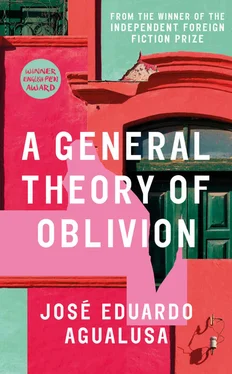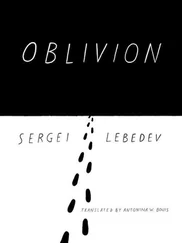‘I’m well aware of that. This will be the last favour I ask you. A lot of people mocked you when you decided to restart your life as a florist. It was a good decision.’
‘You could do the same.’
‘With flowers? I don’t know anything about flowers.’
‘Flowers. Bakeries. Nurseries. Funeral services. In this country everything is just starting up. Any business can work out.’
‘Business?’ Monte laughed. An embittered laugh. ‘I have no talent for multiplying money. I can ruin the very best businesses. I’ll never be more than just about able to scrape by, I’ve already resigned myself to that. So, anyway, give me the snake, and forget the whole thing.’
The following night, one of his men, a solid guy from Malange, armour-plated, whom they called Kissonde, made his way over to the lodge where Daniel Benchimol stayed. It was after midnight. It was raining lightly. Kissonde knocked on the door to bungalow number six. A tall, handsome mulatto man opened it. He was in a nice-looking pair of silk pyjamas, in a metallic blue with white stripes. The agent pointed a pistol at him, while at the same time bringing his left index finger to his lips in an expressive gesture:
‘ Sssshhhhh . Not one word. I don’t want you to get hurt.’ He pushed the mulatto inside and made him sit on the bed. Then, never diverting the threat of the pistol, he drew a bottle of pills from his jacket pocket.
‘You’re going to swallow two. Lie down and you’ll sleep like a baby. Tomorrow you’ll wake up perfectly happy, just a little bit poorer.’
According to the plan, Daniel Benchimol would swallow the pills, and then, after just a few minutes, he would fall asleep. Kissonde was then to put on a pair of thick leather gloves, take from his rucksack a coral snake, which had come from old Uli, grip it by the head and bring it over to bite the journalist. He would then depart nice and quietly, without anyone seeing him, leaving the snake in the bedroom. The following morning a cleaning woman would come upon the dead body, the snake, the bottle of pills, and sound the alarm. A lot of shouting, a lot of weeping. Fine speeches at the funeral. A perfect crime.
Unfortunately, the mulatto refused to stick to the script. Rather than swallowing the pills and falling asleep, he let out a swear word in French, threw the bottle onto the floor, and was about to get up when Kissonde struck him violently, knocking him down. The man was sprawled across the bed, passed out, with split lips, bleeding heavily. Kissonde proceeded with his plan. He forced the pills down his throat, put on the gloves, opened the rucksack, took hold of the snake by the head and made it bite the mulatto’s neck. It was then that another unexpected occurrence took place. The snake clasped itself furiously onto the agent’s nose. Kissonde grabbed hold of it, pulled at it, but the animal didn’t let go. Finally he managed to yank it off. He threw it onto the floor, stamping on it several times. He sat down on the bed, trembling, took his cell phone out of the rucksack and called Monte:
‘Boss, we’ve got a situation.’
Monte, who was waiting for him in the car at the entrance to the lodge, raced over to bungalow number six. The door was closed. He knocked lightly. Nobody came to open it. He knocked harder. The door opened and he was met by the sight of — dishevelled, in underpants, radiating health — Daniel Benchimol.
‘Sorry, are you alright?’
The journalist rubbed his eyes, startled:
‘Shouldn’t I be?’
Monte made up a hasty excuse, another guest had heard a cry, maybe nightbirds going after their prey, a cat in heat, rogue nightmares, excused himself again, wished the astonished journalist a quiet remainder of his night and moved away. He called up Kissonde:
‘Where the hell have you got to?’
He heard a moan. A voice crumbling:
‘I’m dying, boss. Come quick.’
Monte had a brainwave. He ran over to bungalow number nine. He found that the metal number had indeed come loose at the top, and had swung down to form a number six. The door was just pushed to. He went in. Kissonde was sitting facing the door, his face swollen, nose even more swollen, eyelids drooping:
‘I’m dying, boss,’ he said, slowly holding up his hands in a gesture of helplessness. ‘The snake bit me.’
Behind him, Monte saw another guy, bleeding from his mouth.
‘Fuck, Kissonde! What about that guy? Who’s he?’
He went straight over to a jacket hanging on the back of a chair, beside the desk. He rifled through the pockets. He found a wallet and a passport.
‘French! Holy shit, Kissonde, you’ve killed a Frenchman!’
He fetched the jeep. He sat Kissonde at shotgun. He was about to drag out the inanimate body of Simon-Pierre when he was surprised by one of the lodge’s guards.
‘Well now!’ sighed Monte. A bit of good luck amid the bad. The man had worked with him in the hard years. The guard stood to attention:
‘Commander!’
He helped Monte put Simon-Pierre on the back seat of the jeep. He brought clean sheets. They made the bed. They cleaned the room. They put the snake (what was left of it) into Kissonde’s rucksack. When Monte was just about to leave, after handing the guard a hundred dollars to make it easier for him to forget the whole episode, he spotted the felt hat the Frenchman had worn as he wandered around Luanda.
‘I’m taking the hat. I’ll take some clothes, too. Nobody goes missing in their pyjamas.’
He dropped Kissonde at the military hospital. He drove an hour to a piece of land he had bought years earlier, having intended to build there, far from the noise of Luanda, a wooden house, painted blue, where he and his wife would face their old age. He parked the jeep beside an enormous baobab. It was a lovely night, lit by a copper moon, round and tight as the skin of a drum. He took a shovel from the trunk and opened a grave in the soft earth, wet from the rain. An old Chico Buarque song came to his mind: ‘ This grave where you lie / measured out by hand / is the smallest expense you ever claimed from the land / the grave is a good size / not too deep a foundation / it’s the part that falls to you of this whole plantation .’ He leaned up against the baobab, humming: ‘ The grave is very large / for your corpse off its bier / but you’ll be a bigger man / than you ever were here. ’
In the penultimate year of high school, in the city of Huambo, he had joined an amateur theatre group that had staged The Death and Life of Severino , a play with words by João Cabral de Melo Neto and music by Chico Buarque. The experience changed how he looked at the world. He understood, as he played the part of a poor peasant from the Brazilian north-east, the contradictions and injustices of the colonial system. In April 1974 he was in Lisbon, studying law, when the streets were filled with red carnations. He bought a ticket and returned to Luanda to start a revolution. So many years had gone by, and there he was, humming ‘The Labourer’s Funeral’ while he buried, in an unmarked grave, a writer who hadn’t had luck on his side.
He re-entered Luanda at four in the morning. He was thinking about what he might do next, how to justify the disappearance of the Frenchman, when, just as he was passing the Quinaxixe market, inspiration struck. He parked the car, and got out. He took the dead man’s hat and made his way round to the back of a building, next door to a nightclub, the Quizás, Quizás, where Simon-Pierre had been that night. He put the hat down on the damp ground. There was a kid asleep next to a dumpster. He woke him with a thump:
‘Did you see that?!’
The boy leapt up, confused.
Читать дальше












